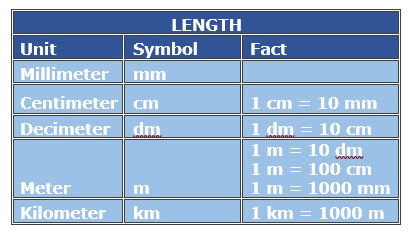
- Metric Units of Measurement
- Home
- Choosing Metric Measurement Units
- Measuring Length to the Nearest Centimeter
- Measuring Length to the Nearest Millimeter
- Metric Distance Conversion with Whole Number Values
- Metric Mass or Capacity Conversion with Whole Number Values
- Metric Distance Conversion with Decimal Values
- Metric Conversion with Decimal Values: Two-Step Problem
- Time Unit Conversion with Whole Number Values
- Introduction to Adding Time
- Introduction to Elapsed Time
- Converting between Metric and U.S. Customary Unit Systems
Metric Conversion with Decimal Values: Two-Step Problem
Introduction
The basic metric units are meters (for length), grams (for mass or weight), and liters (for volume).
The different tables help in converting among these metric units of length, weight and capacity.
In this lesson, we solve problems on conversion among metric units involving two-steps and decimal values.

Example 1
Fill in the blank to make the conversion true.
4500000 millimeters = __ kilometers
Solution
Step 1:
We know that
1 kilometer (km) = 1000 meters (m)
1 meter (m) = 1000 millimeters (mm)
Step 2:
4500000 millimeters = 4500000 mm × 1 m/1000 mm × 1 km/1000 m
= 4.5 km
So, 4500000 millimeters = 4.5 kilometers
Example 2
Fill in the blank to make the conversion true.
3.99 kilograms = __ milligrams
Solution
Step 1:
We know that
1 kilogram (kg) = 1000 grams (g)
1 gram (g) = 1000 milligrams (mg)
Step 2:
3.99 kilograms = 3.99 kg × 1000 g/1 kg × 1000 mg/1g = 3990000 mm
So, 3.99 kilograms = 3990000 milligrams
Example 3
Fill in the blank to make the conversion true.
3356000 milliliters = 3.356 kiloliters
Solution
Step 1:
We know that
1 kiloliter (kl) = 1000 liters (l)
1 liter (l) = 1000 milliliters (ml)
Step 2:
3356000 milliliters = 3356000 ml × 1 l/1000 ml × 1 kl/1000 l = 3.356 kl
So, 3356000 milliliters = 3.356 kiloliters